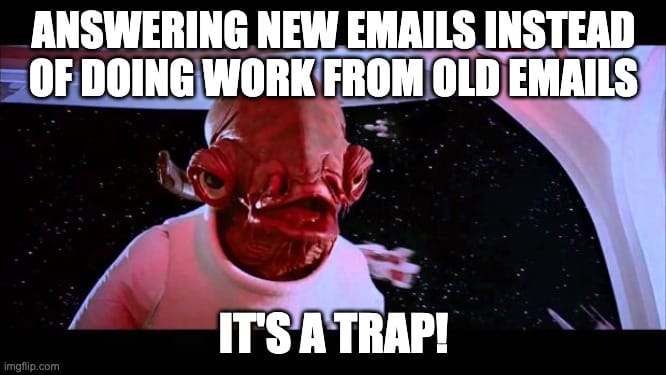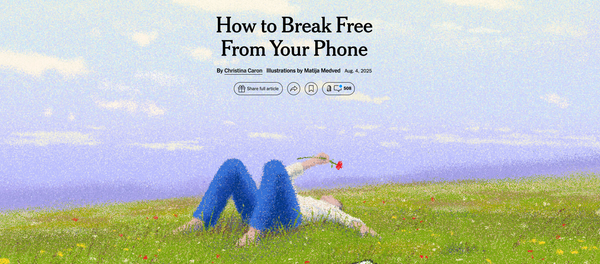Forming Finitude: Dropping the ball, intentionally
Getting (fewer) things done

Sometime during my final year of seminary or just after (I can remember because I know I was in Kristin's gorgeous Morningside Heights apartment), I encountered David Allen's Getting Things Done: The Art of Stress Free Productivity.
I love a good system, and his system was clear and relatively straightforward. The key points, as I internalized them, was separating the processing of incoming work requests (via emails, meeting notes, etc.) from the actual work time when you Get Things Done.
There's a really important insight here: you can't work if you're spending all day getting pinged by your messaging tools and having to revise your work plans on the fly and getting increasingly frazzled and frustrated about not having actually Gotten Things Done besides answering messages.

Close your email/texts/slack and actually work is, of course, good advice, and the more we can take it without becoming a bottleneck to others, the better. I think the take of whatever Allen disciple I had encountered involved forwarding emails to an Evernote-based work list or something, of course with clear instructions to your future self about the definitive action required. Which you will later set time on your calendar to do.
I'm not surprised that 28-year-old Kyle found this system appealing. Allen promised a set of procedures that together formed a suit of armor, a failsafe plan to avoid dropping the ball on any of one's responsibilities.
I had also, at that point in my life, never NOT been a student, having gone from undergrad to graduate school to seminary. I lived one semester at a time, essentially constructing a giant months-long to-do list and then pursuing it doggedly according to whenever the next paper/project/test was happening, and then getting a little break afterward, as a treat.
Don't get me wrong: I had worked plenty of jobs and gigs and internships both during and between semesters. But the parameters of these roles were explicitly compatible with semester-based student life.
Most importantly, I had to learn that things would go on my to-do list that would never come off it, and that was OK. (There was a GTD-sanctioned Someday list with no due dates, after all!) I wasn't working from syllabi any more. The work I had to do was subject to negotiation with my supervisors—and, most importantly, myself.
Over the years, I would continue to be an avid reader of what I would eventually learn to call productivity porn: life hacks, "one weird trick"-style clickbait, endless refinements on Getting Things Done or various proposed replacements that addressed its pitfalls.
It would all be worth it, I was promised, in order to achieve the grand motivating objective of the GTD approach: "mind like water."
The idea is that if you can be confident you're not forgetting something, if you can open your messaging inboxes and work plans knowing that you've carefully processed and planned and prioritized, then you can have a little peace of mind when you're not doing those things.
Perhaps you can even get into a flow state in which you get lost doing the work, or play, that you love, free from the distraction of worrying about anything but the high-priority task ahead of you.
It all sounds great, and at times it has even worked for me. But here's the problem.
And this is still an issue even if you're not an over-functioning Try Hard like me. Because there's a good chance you work with other people, might even lead other people within an understaffed or under-engaged organization. Those people might, let's just say, be remembering the church of the mid- to late-20th century, when more people attended and when volunteer organizations of all stripes ran largely on the unpaid labor of stay-at-home moms.
And if any of that is the case, the system will try to get you, and the system as a whole, to try to do too much. "Because we've always done it that way," etc.
I feel like we were, culturally, just starting to get the point that "do less and do it better" was a life-giving mantra. And then AI tools came along to try to convince us all over again that it is possible to do it all.
I tried one of them for three or four months, Motion. It had some nice features. It scheduled my meetings in batches to try to carve out longer blocks of focus work. It suggested I work on tasks I actually had time for, based on the realities of my schedule on a given day. It reprioritized tasks by deadline.
Over time, I found myself ignoring its suggestions. At first I thought it was because I didn't like being bossed around by a computer. Or that sometimes the AI was making different judgements than I was about what was truly my highest priority.
I think the reality was simpler: I was telling it to help me get more things done than my finite human capacity was capable of doing.
I have finite energy. I have finite judgment. I have finite time. I do not have finite desire to care about the world or ambition to achieve things.
I forget the contradiction, and I become a menace all over again.
Sometimes that means removing things from that Someday list, and trusting the Spirit will lead me back if those projects or ideas should someday become a priority.
And what I've learned from observing some very skilled organization leaders close up is that I have to work especially hard to name that I am dropping a ball, and why. "I am pioritizing X over Y. So for the time being, and perhaps for ever, I am going to drop the ball on Y. You should too."
I hate this. So do churches. I think we have to help each other do it anyway.
Go forth, disciples, and Get (Fewer) Things Done.



